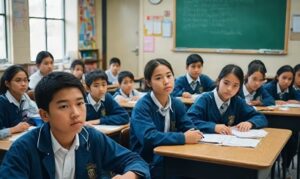In the digital age, technology is revolutionizing traditional education models, creating dynamic and personalized learning experiences. The integration of digital tools and platforms has transformed classrooms, making education more accessible and engaging for students worldwide.
One of the most significant changes is the shift towards online learning. Virtual classrooms, powered by platforms like Zoom and Google Classroom, have become the norm, especially post-pandemic. These platforms facilitate real-time interaction between teachers and students, breaking geographical barriers and enabling global collaboration. Moreover, they offer flexibility, allowing students to learn at their own pace and on their own schedules.
Artificial Intelligence (AI) is another game-changer in education. AI-driven applications provide personalized learning pathways, catering to the unique needs of each student. Adaptive learning systems analyze a student’s performance and adjust content and pace accordingly, ensuring optimal learning outcomes. For instance, platforms like Khan Academy use AI to offer tailored exercises and feedback, helping students master concepts more efficiently.
Additionally, gamification is making learning more interactive and enjoyable. Educational games and simulations foster engagement and motivate students to achieve learning goals. Tools like Duolingo and Minecraft: Education Edition exemplify how gamified learning can enhance skills such as language acquisition and problem-solving.
Furthermore, augmented reality (AR) and virtual reality (VR) are providing immersive learning experiences. These technologies allow students to explore historical sites, conduct scientific experiments, or even practice surgical procedures in a virtual environment, making learning more practical and impactful.
In conclusion, the future of education in a digital age promises a more personalized, flexible, and engaging learning experience. By embracing these technological advancements, we can enhance learning outcomes and better prepare students for the challenges of the 21st century.

